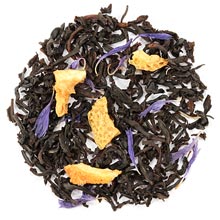Hydrate with Tea: Myths and Science
by Jessica Maciuch
June 29, 2021

The Science of Hydration
It's safe to say that most people have a colloquial understanding of hydration and dehydration. But what does hydration actually mean, on a biological level?
Human bodies are largely made of water between 75% of total body mass in infants to 55% in the average elderly population. Approximately two-thirds of that water is located within cells, with the rest stored outside or in between cells. Water is often a vital component in the thousands of biochemical reactions that take place in your body every day, such as the processes that convert food into energy for daily tasks. Beyond the cellular level, water is also required to maintain body temperature and blood circulation. Because of its importance, the amount and distribution of water in your body are tightly regulated by a complex system that includes the kidneys, the nervous system, and a range of neurohormones.
How Much Water is Enough?
While there have been numerous studies and publications attempting to determine recommended values for daily water intake, two, in particular, are often referenced: the 2004 U.S. National Academy of Medicine (NAM) publication, and the 2010 European Food Safety Authority (EFSA) panel report.
The recommended daily water intake for adult men and women in the 2004 report was 3700 mL and 2700 mL, respectively. The EFSA report recommends 2500 mL per day for adult men and 2000 mL for adult women. However, both reports stress that no general guideline can correctly account for the specific dietary needs and conditions of the individual.
Recent research concludes that the answer might actually be more simple than expected: since the feeling of thirst is triggered by a specific neuropeptide involved in the body's complex system of maintaining water balance, the most effective way to determine ideal hydration level might simply be to drink whenever you feel thirsty.
Origins of the Myth
While the idea of coffee and tea causing dehydration is widespread in the medical community, the actual scientific basis comes from only a small handful of papers, most notably Robertson et al. (1978), Passmore et al. (1987), and Neuh Berthold et al. (1997). All three studies looked at the diuretic effect of caffeine. In layman's terms, a diuretic is anything that increases the amount of urine your body produces, which contributes to dehydration due to loss of water.
These studies found a positive correlation between caffeine intake and increased urine volume. It is important to note, however, that the diuretic effect was only observed when the subjects were given a dose of caffeine that was much higher than they were used to 250 mg to subjects that had abstained from caffeine for 3 weeks 642 mg for subjects that had abstained for at least 5 days , and 360 mg to subjects that were used to 240 mg per day.
Just how much caffeine is that? For reference, Chin et al. (2008) tested 20 different teas for the caffeine content, and the most caffeinated black tea only clocked in at 61 mg per cup.
A Dose-Dependent Relationship
So what happens when subjects consume the same amount of caffeine they are used to? Numerous studies say that the diuretic effect is reduced substantially, if not entirely. In subjects that regularly consumed 3-6 cups of coffee per day, Killer et al. (2014) found that the same amount of coffee and water produced no difference in urine volume, body mass, and other measures of hydration.
In the 8 papers reviewed by Ruxton et al. (2008), there was no observable diuretic effect for caffeine dosage up to 420 mg per day. The dose of caffeine was much higher in the three studies that found higher urine volume after caffeine ingestion. However, additional findings in those studies suggest that the diuretic effect is lessened by physical activity (Wemple et al. 1997) and by repeated ingestion of the same dose for 48 hours (Bird et al. 2005).
The Bottom Line
So what does this mean for tea and hydration? Taken all together, this research suggests that as long as caffeine consumption is relatively consistent and stays within a moderate range (one paper suggests an upper limit of 400 mg or approximately 6-8 cups of black tea per day), there is no reason to assume tea causes dehydration in the general population.Furthermore, in a study comparing the hydrating effects of various beverages, tea showed the same effects as water on hydration level.

Customize your own 40 oz Glass Teapot set with your choice of tea sampler (includes 4 sample-sized teas) and 4oz jar of honey!
A complete set is only $39 (save 22% off regular prices) and available until July 3, 2021 here.
Since getting enough fluids is so important for health, tea should absolutely be embraced as a way to stay happy, healthy, and hydrated!